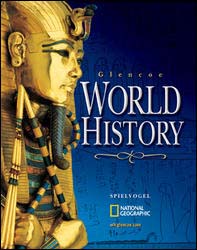Glencoe World HistoryChapter 2:
Western Asia and Egypt, 3500–500 B.C.Chapter OverviewsChapter 2 describes the rise of civilization in a region stretching from the Persian Gulf to Egypt. The early civilizations of this region emerged in the river valleys of the Tigris, Euphrates, and Nile Rivers. Farming was the economic base for the growth of civilization. Egyptian civilization was remarkably stable, and ruling dynasties lasted for many centuries. Civilizations between the Tigris and Euphrates were often toppled by invasions. The invaders established their own dynasties and brought new ideas and practices with them. Section 1 Civilization Begins in Mesopotamia
Mesopotamia—the region between the Tigris and Euphrates rivers—was the birthplace of several of the earliest known civilizations. Rainfall was sparse and unpredictable, but occasional floods had deposited layers of fertile silt. Irrigation and drainage techniques made regular farming possible; food supplies prompted social and economic changes that led to the emergence of civilization. As early as 3000 B.C., Sumerians engaged in wide-spread trade and built walled cities that had economic and political control over the surrounding countryside. Like other Mesopotamians, Sumerians believed gods and goddesses controlled the universe and owned the cities, which were administered by priests and priestesses. Eventually power passed to kings. The Sumerians also created the cuneiform of writing and invented tools and devices such as the wagon wheel. The Akkadians eventually overran the Sumerian city-states and created the first empire in world history. A return to city-states and other rulers followed. One of these rulers, Hammurabi, is remembered for his strict code of law. Section 2 Egyptian Civilization: "The Gift of the Nile"
Egyptian civilization shared many features with early Mesopotamian civilization. It grew out of the farming economy along a major river, the Nile. Historians describe three major periods in early Egyptian civilization: the Old Kingdom, the Middle Kingdom, and the New Kingdom. While for a short period the Egyptians were ruled by the Hyksos, they eventually expanded their empire. After the New Kingdom collapsed in 1084 B.C., Egypt was dominated by a succession of other empires. Religion was important for the Egyptians, who lived in a structured society dominated by priests and nobles. Egyptians believed that their kings, often called pharaohs, ruled by divine right. They created an extensive government bureaucracy and built the pyramids as tombs for mummified pharaohs. Art, science, and a form of writing called hieroglyphics also flourished in Egypt. Section 3 New Centers of Civilization
Around 1200 B.C., several smaller groups, including the Phoenicians and the Israelites, established small kingdoms and city-states. The Phoenicians improved their ships and built an extensive trading empire and colonies. They invented an alphabet that was passed on to the Greeks. The Israelites were a minor political force, but they created a world religion known today as Judaism. The kingdom of Israel divided into two separate kingdoms, but successive defeats by invaders ended political independence, and Judaism became a stateless religion. The Jews were monotheistic and believed that a covenant required obedience to the law of God. This law had been revealed to them during the exodus from Egypt. The golden age of Israelite prophecy began in the mid-eighth century B.C. Both within the kingdom and in exile, prophets developed new concepts that became a source for universal ideals of social justice. Section 4 The Rise of New Empires
With the help of a large army with iron weapons, the Assyrians established a new empire by 700 B.C. They built an effective system of communication and one of the world's first libraries. After the collapse of the Assyrian Empire, the Persian Empire became the leading power in western Asia. Under Cyrus, the Persians created a state that stretched from Asia Minor to western India. Cyrus ruled with remarkable wisdom and compassion for his subjects and the peoples of the lands he conquered. Cyrus's successors expanded the empire, relying on a system of provincial governments that collected taxes, provided justice and security, and recruited soldiers. A major cultural contribution of the Persians was their religion, Zoroastrianism. The Persian Empire eventually collapsed and was conquered by Alexander the Great.  | 

















